
AI is taking the world by storm. In all aspects of work and your personal life, AI is likely already having an impact to some extent.
SEO is no exception to this rule, in fact, we can expect that AI is going to completely disrupt and change the game going forward.
And like Microsoft, who’ve been quick to add AI capabilities to their Bing search engine, Google is also jumping onboard with their Google Search Generative Experience (SGE).
But what can we expect from SGE this year and how far along is it from being fully released? Or are the rumors true that Google is stopping SGE?
In this post, we will attempt to answer all these questions and we’ll also share insights from several marketers on how they think the SEO landscape is going to change when Google launches SGE.
Key Takeaways
- Google’s SGE is still in the experimentation phase.
- Google is currently testing Gemini, its generative AI, within SGE to see if it can improve the accuracy and quality of AI-generated results.
- Contrary to rumors, Google is not stopping development on SGE.
- Consumers want AI-powered search results.
Marketers Featured in This Article
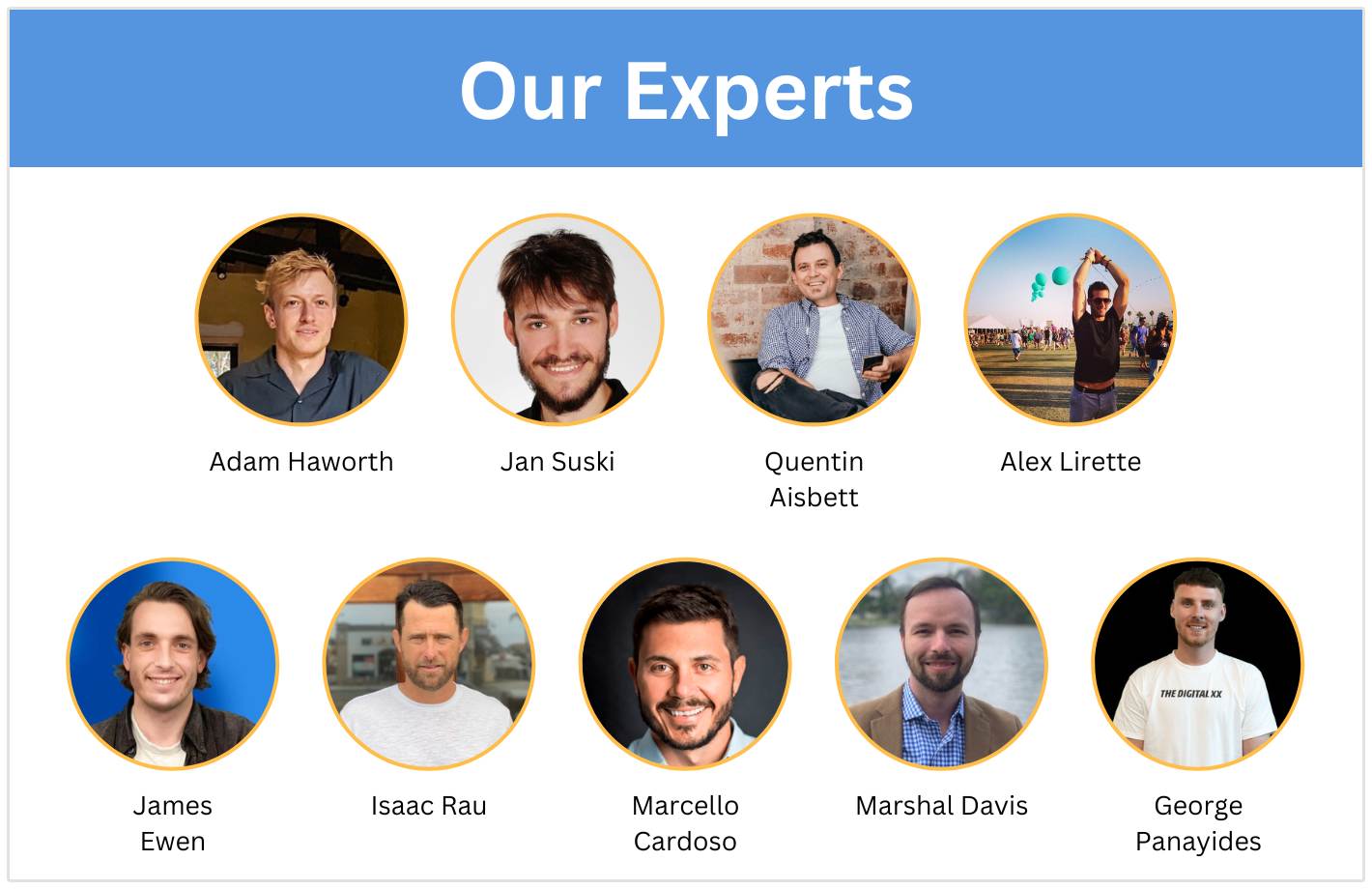
We’d like to give special thanks to the following digital agency founders and SEO experts for their valuable insights and feedback:
- James Ewen, Founder @ SEOtagg, United Kingdom
- Adam Haworth, Founder @ Contactora, United Kingdom
- Jan Suski, Content Specialist @ Linkhouse, Poland
- Quentin Aisbett, SEO Strategist @ Searcht, Australia
- Alex Lirette, CEO @ Orbital SEO, United States
- Isaac Rau, CEO @ Proactive Solutions, United States
- Marcello Cardoso, Founder @ Cabana Digital, Brazil
- Marshal Davis, President @ Ascendly Marketing, United States
- George Panayides, SEO Specialist @ The Digital xx, United Kingdom
What is Google’s SGE?
SGE is Google’s introduction of generative AI technology in Search.
SGE is a project that's part of Google Labs, a program for testing cutting-edge technologies to improve Google products such as Search, Photos, Google Home, Google Workspaces, etc.

The main objective of Google’s Search Generative Experience is to push the limits of Google’s main product, its search engine. The idea is to create a more immersive search experience for users.
SGE is a significant step towards personalized search results.
- George Panayides, The Digital xx
How Far Along is SGE?
While SGE is still in its experimental phase, users can test it out and use it to perform searches on Google. (more on how to enable SGE later)
Initially, the Google Labs website showed that the SGE experiment was going to end in December 2023. However, Google recently updated the SGE landing page, but removed the experiment’s end date from the website.
Does this mean Google is releasing SGE into the wild soon? Or is Google going to axe the entire thing?
Is Google Stopping SGE?
There are some rumors making the rounds that Google is stopping SGE.
The source of these rumors come from a Google blog post announcing two new AI-powered features. At the end of the post, Elizabeth Reid, VP of Search, wrote the following statement:
We’ve gotten lots of useful feedback from people who’ve chosen to join this experiment, and we’ll continue to offer SGE in Labs as a testbed for bold new ideas.
The words “we’ll continue to offer SGE in Labs as a testbed for bold new ideas” is what sparked the rumors and debate.
Ross Hudgens, CEO of Siege Media, shared an elaborate post on what he thinks Google is trying to say with those exact words:
SGE connected to testbed feels like a comment on SGE not being ready for the big-time, nor that it is expected to ever be….Bits and pieces of SGE may see the big time, but it seems unlikely the product we saw on every search result last year will get there any time soon.
The comments section below the post also reveal how many marketers and SEOs believe that the project doesn’t have any wings and will likely not see the light of day for various reasons.
So then, is Google stopping SGE?
The facts are that Google has not confirmed that they are stopping SGE. Everything else up to this point is just pure speculation.
And looking at the data, it doesn’t seem like SGE is getting cut any time soon. Authoritas recently published an in-depth research article showing that SGE results are showing for 86% of search queries.
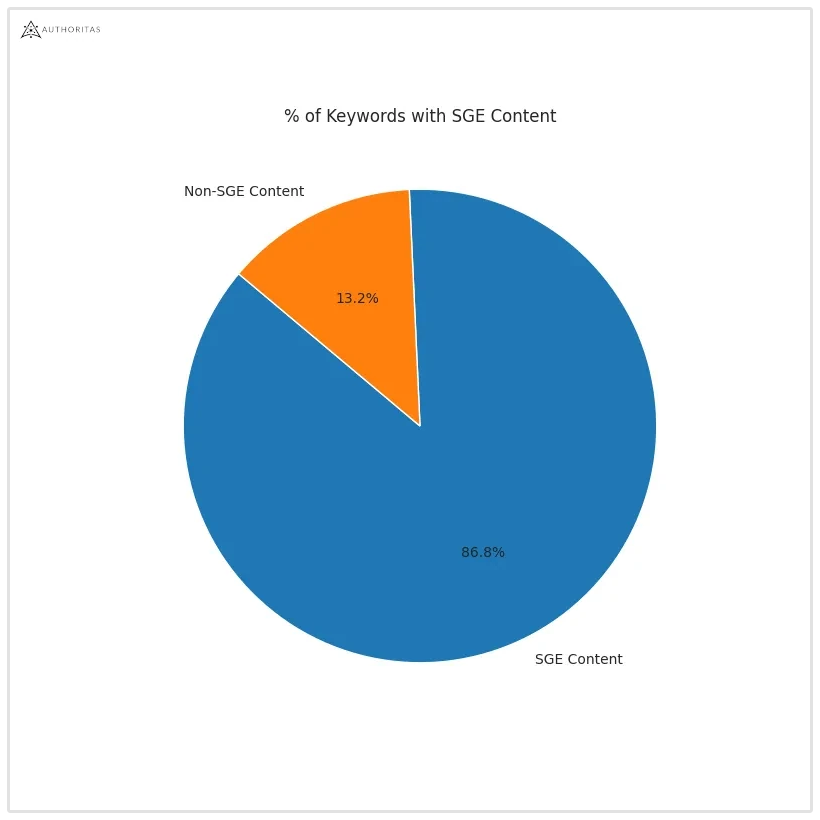
Furthermore, the CEO of Google himself noted in Alphabet’s 2023 Q3 earnings call that they are pleased with user feedback on SGE and are continuing to experiment with it.
We are still in very early days in terms of how much we have rolled it out. But we have definitely gotten it out to enough people, both geographically, across user segments and enough to know that the product is working well. It improves the experience. - Sundar Pichai
And in the Q4 earnings call, Sundar said that he’s happy with the results they are seeing as they are integrating Gemini, Google’s ChatGPT competitor, into the main product:
We’re already experimenting with Gemini in Search, where it’s making our Search Generative Experience, or SGE, faster for users. We’ve seen a 40% reduction in latency in English in the US. I’m happy with what we’re seeing in the earliest days of SGE.
So no, as things stand now, Google isn’t stopping SGE.
I do think that they were a bit optimistic about ending the experiment in December 2023 since it sounds like they’re still busy trying to find the best ways of integrating it with Search without disrupting their business model and key revenue driver, Google Ads.
Consumers Want AI-Powered Search
What do consumers and users actually say about an AI-powered Search experience?
Data from Statista reveals that 49% of 2,200 adults in the United States are most interested in an AI-powered search product compared to other AI products.
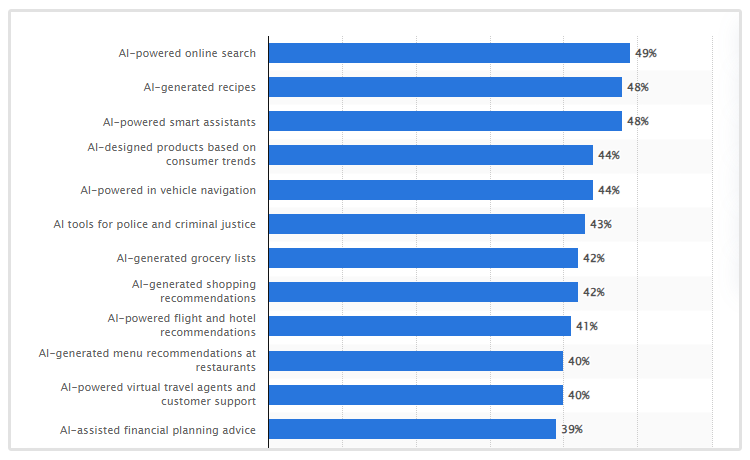
The same study reveals that millennials are more likely to switch to an AI-powered search engine. Across all adults, 46% of the study would switch to an AI-powered search engine.
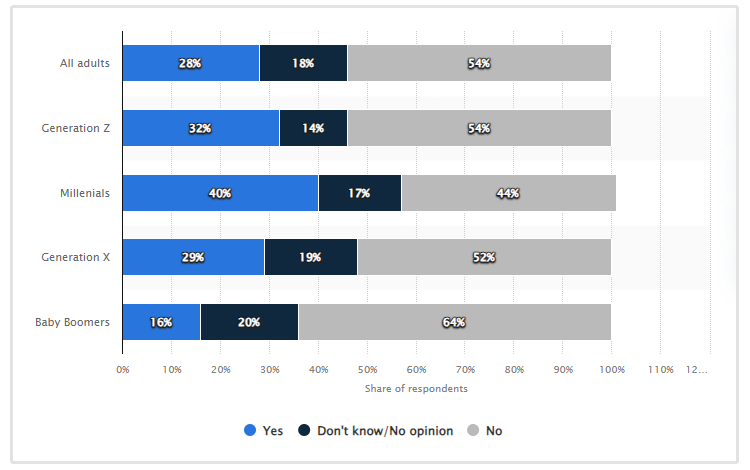
Researchers at McKinsey also found that 22% of people regularly use AI in their own work, and 79% say they’ve had at least some exposure to generative AI, either for work or for their own personal use.
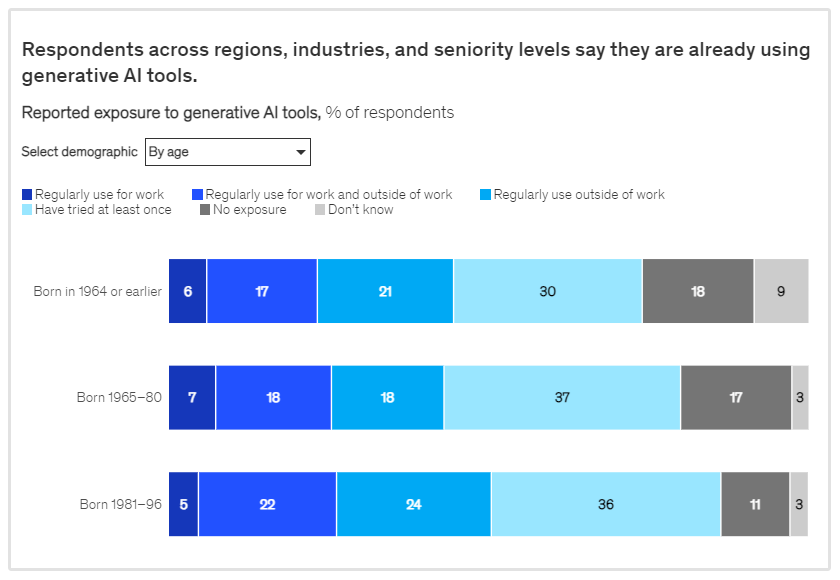
I think it is safe to assume that most people will want an AI powered search engine as the technology improves. Furthermore, many consumers are already using generative AI tools in their work and personal lives.
Let’s be honest, Google can’t let an opportunity like this pass. Especially with tools like Perplexity.ai and their biggest competitor (Microsoft Bing) who have already added AI in their search experience.
So then, if Google decides to launch SGE, either fully or only certain parts of it, how will SEO change going forward?
How Might Google’s SGE Change SEO?
While SGE isn’t available for all users, there have been numerous articles, blogs, and snapshots on what it will look like in the SERPs.
Here is a list of the ways in which we expect Google’s SGE is going to change SEO and search marketing.
Changes in the SERP Layout
One of the most obvious changes to Google SEO is the layout of the traditional SERP.
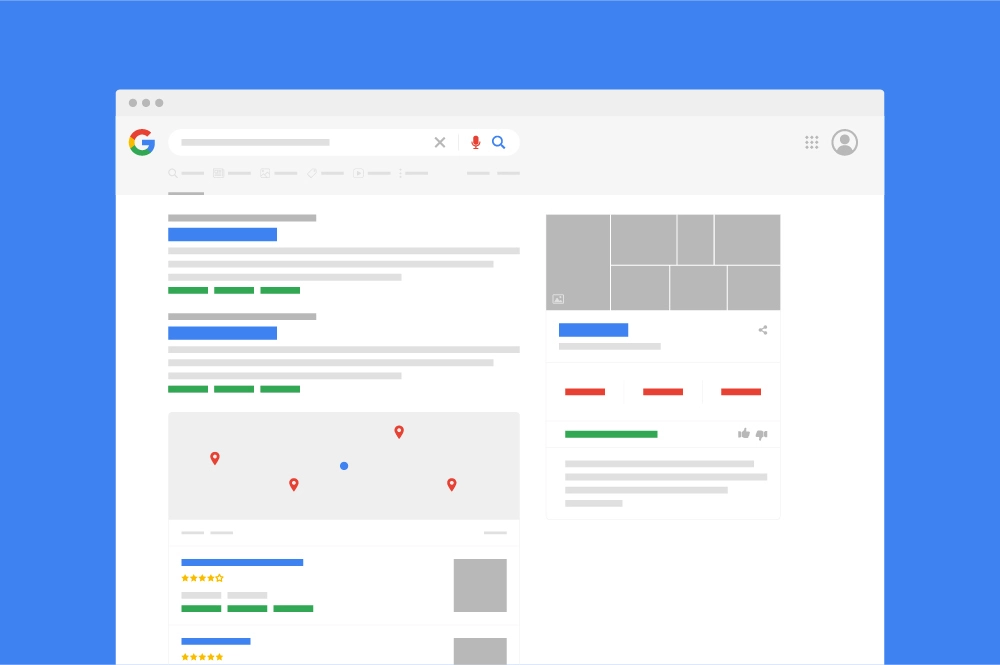
AI-generated overviews will occupy more space, often filling the entire screen on desktops and requiring scrolling on mobile devices.
This change reshapes the way organic results are displayed and interacted with by users.
It will become crucial to optimize your content in order to be featured in SGE overviews, using engaging visuals, and understanding the new dynamics of keyword and content relevance.
At Linkhouse, we've already started experimenting with content formats and layouts that are more likely to be featured in SGE overviews.
- Jan Suski, Linkhouse
Lower Click Through Rates
SGE will drastically change search and how users use Google, more specifically, Click Through Rates (CTR) will likely see a drop.
This is because Google will put the information users seek above the organic website search results.
We anticipate up to a 30% decrease in organic traffic for some of our client's sites, especially where AI-generated overviews are prominent, as they tend to push down regular search results.
- James Ewen, founder at SEOtagg
For instance, check the result for the search query “how to add a subdomain on cpanel”, you can see that the AI generates a lengthy answer on the exact steps you need to follow to complete the task.
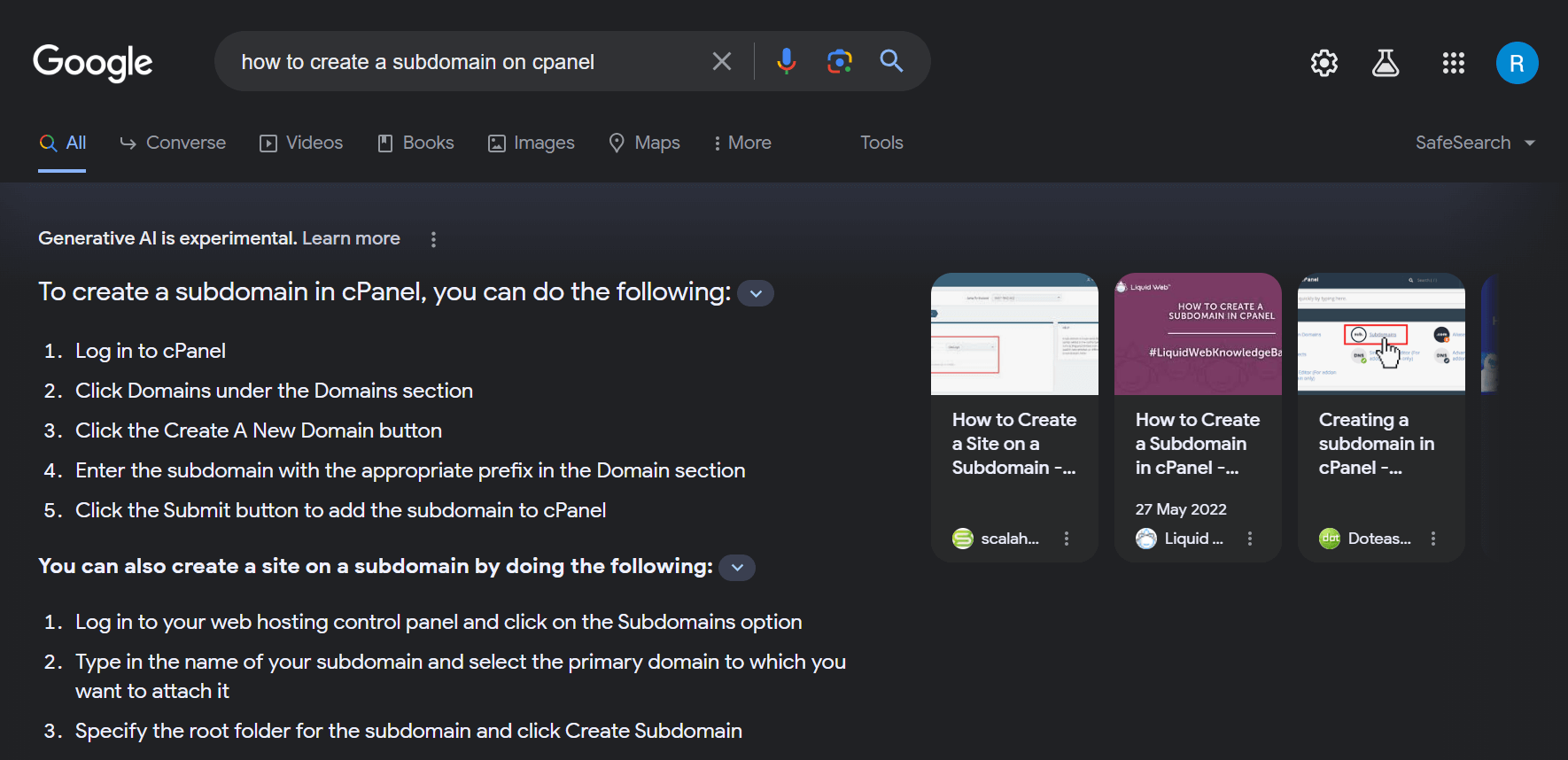
Adam Haworth, founder and CEO of Contactora, an AI-driven SEO agency based in the UK expects that by the end of 2024, CTR will be hugely impacted on informational search results.
Expect to be able to complete transactions within search, without needing to go to a website.
- Adam Haworth, Contactora
Adam advises that businesses start adjusting their content slightly to include summarized answers to specific questions/search intent at the top of the content.
Including TL;DR sections is expected to help get within SGE snippets.
Immersive Search Experience
By providing the searcher with the opportunity to ask follow-up questions, SGE introduces a more interactive search experience.
Here’s an example of this in action, if you search for “how do you pack for the beach when flying”, you’ll see an AI-generated answer, but if you scroll down you can ask a follow-up question like “can you bring a towel in your carry on” or “what should I pack for a day at the beach in the UK.”

Google automatically generates these follow-up questions relevant to the initial search, but users can also ask their own follow-up questions.
In my opinion, this will require content layers that the average business website simply doesn't have. This is where I see SGE potentially influencing SEO moving forward.
- Quentin Aisbett, Searcht
For years, the main focus has been on content satisfying the initial search query. But what about the second and third follow-up questions?
Sites with robust support or help subdomains containing hundreds or thousands of Q&As could be well-positioned.
By investing in content expansion, brands can increase their chances of being the information source in SGE results.
More Personalized Search Results
One of the primary features we can expect from the introduction of Google’s SGE is results that are even more specific to the user’s search queries.
For instance, if you search for “what equipment do I need for bikepacking”, Google will just give you a featured snippet with some content on “How to choose bikepacking bags” and then the list of the regular search results.

With SGE activated, you can see that Google compiles a list that is more specific to the query.
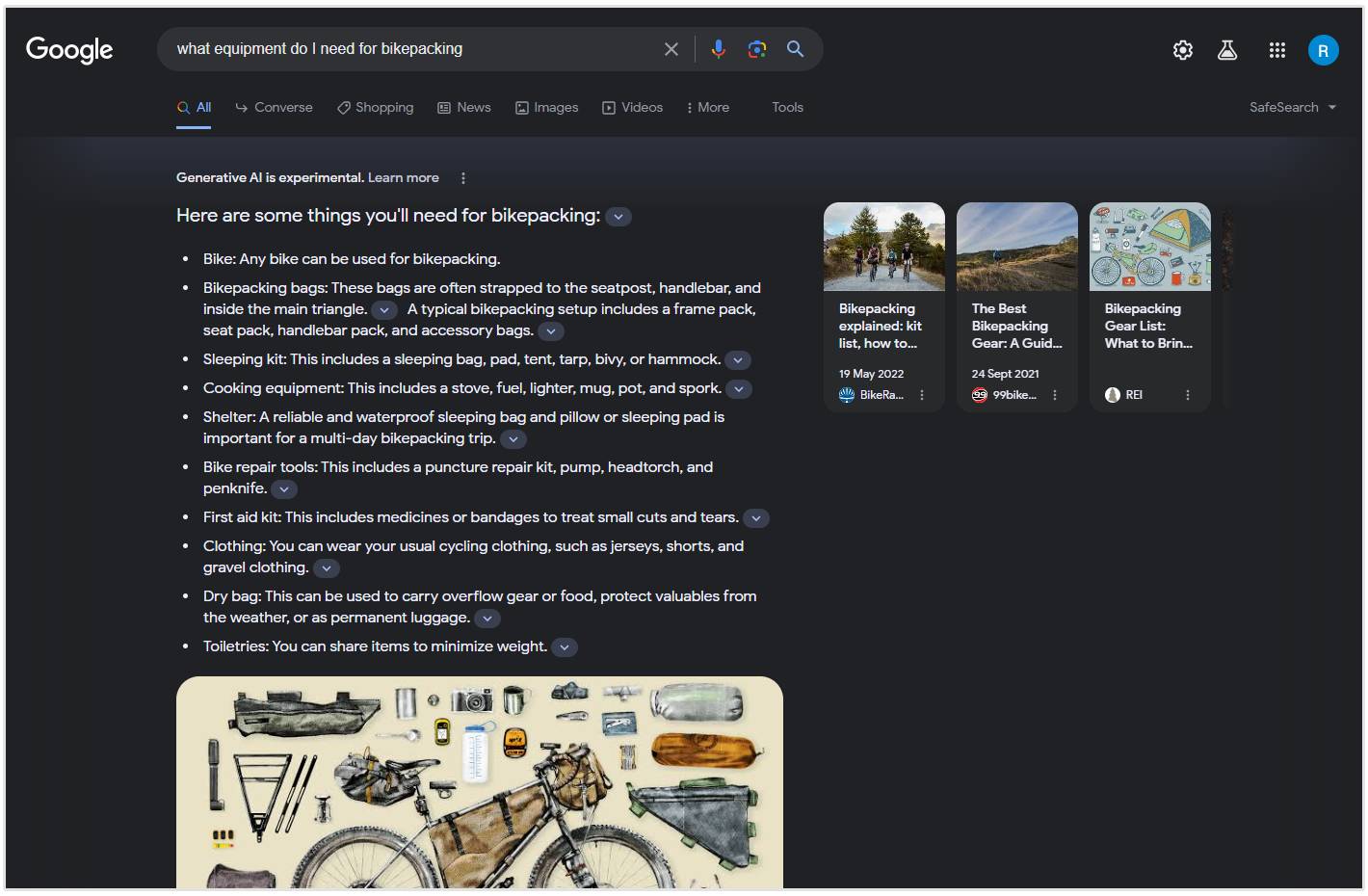
This means that marketers and SEOs will have to focus on user search intent instead of the traditional keyword-centric approach towards SEO.
Isaac Rau from Proactive Solutions, a digital agency based in Long Beach, California believes that with the introduction of SGE, Google will place an even greater emphasis on understanding your user’s search intent and context
Keyword optimization remains essential, but incorporating semantic search elements and understanding user intent becomes paramount in the SGE era.
- Isaac Rau, Proactive Solutions
The days of creating content for just anyone are over, instead, those who want to win will have to be very specific on the content they create and for whom.
A crystal clear understanding of your customer persona will assist you in determining the type of language and keywords your idea buyer uses to find information online.
A good starting point to determine user intent is to use a software like SEOptimer’s Keyword Research Tool to find the keywords people are typing into Google.
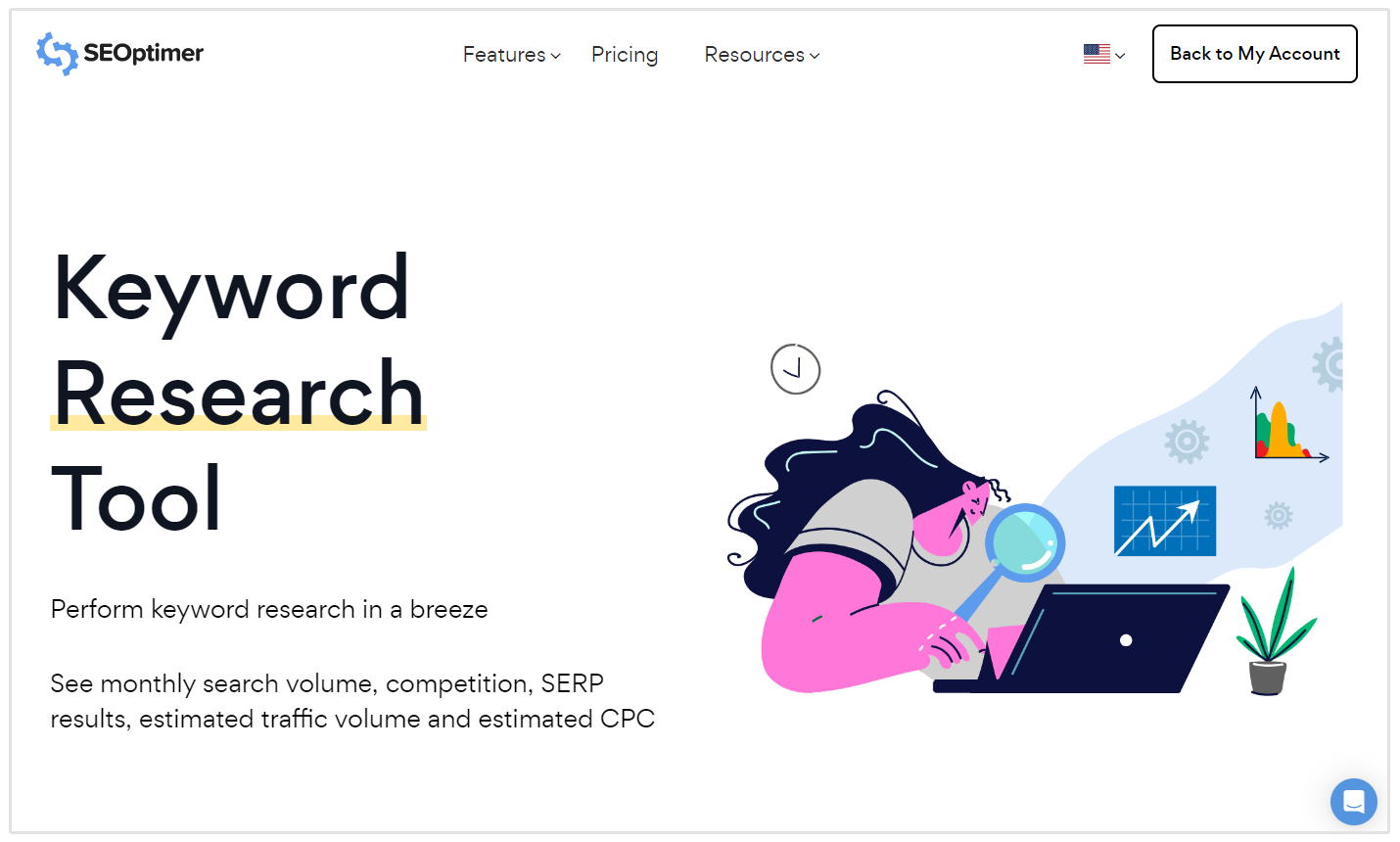
Voice Search will Become More Significant
According to Oberlo, around 50% of the US population uses voice search at least once a day. We can expect this figure to grow even more with the rise of AI in Google Search.
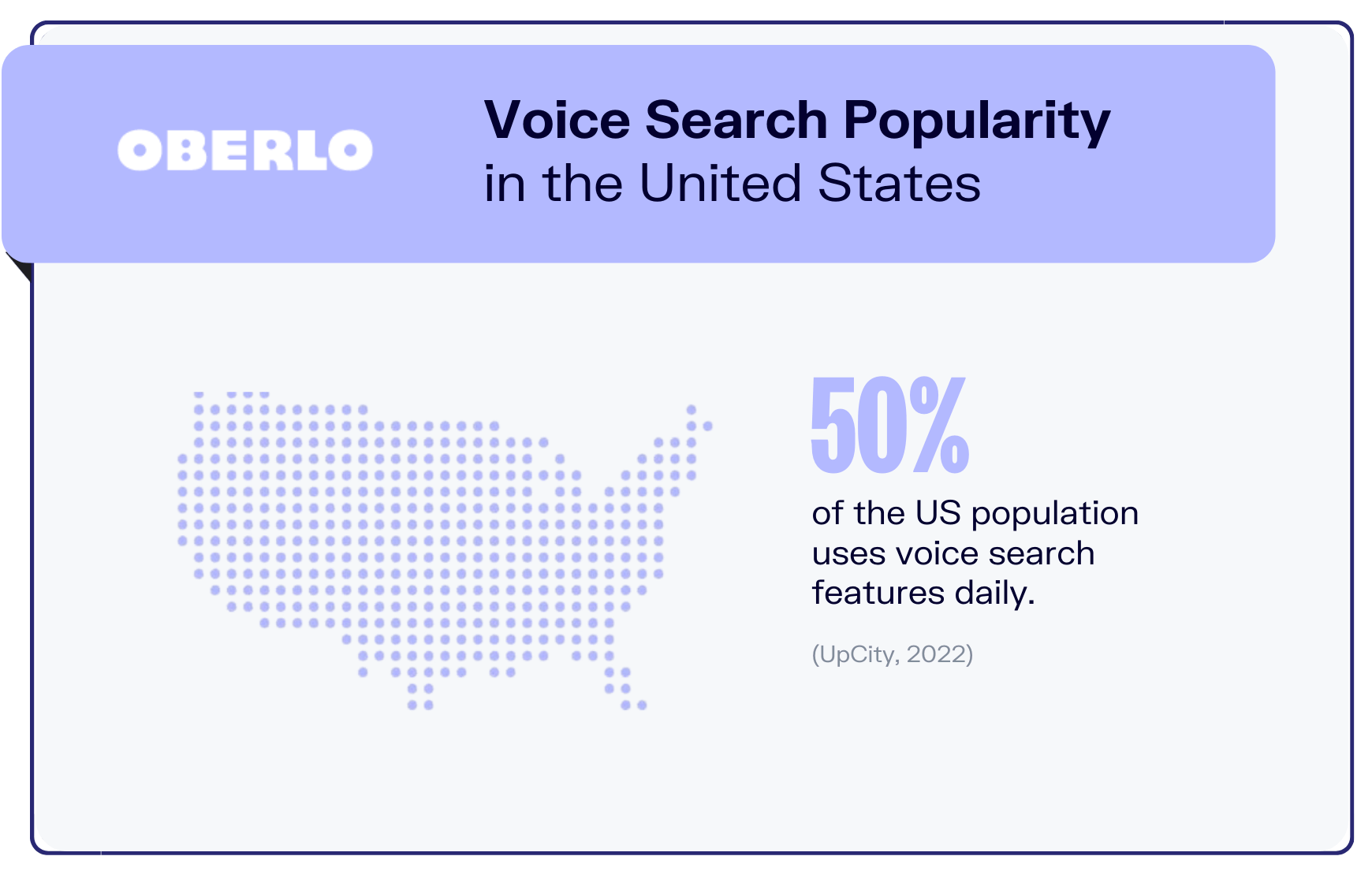
Because of the conversational nature of SGE and the improvements in voice search capabilities, optimizing content and your website for voice SEO will become crucial as Google rolls out SGE to all its users.
With the increasing popularity of voice assistants like Siri and Google Assistant, search queries have become more conversational. SEO professionals must optimize their content for voice search queries, often with a more natural and long-tail keyword structure.
- Alex Lirette, Orbital SEO
Importance of a Website’s Overall Relevance
Marcello Cardoso, the CEO and Founder of Cabana Digital, a digital agency based in Brazil, predicts that the overall relevance and quality of a website will play a greater role in the new era of AI in Search.
SGE’s ability to generate meta descriptions based on multiple sources implies the increasing importance of a website’s overall relevance and quality. It means paying more attention to the entirety of your site's content, not just the main pages you're optimizing.
- Marcello Cardoso, Cabana Digital
This holistic approach to SEO will reward comprehensive and insightful websites that stick to one niche or area.
For instance, websites that cover politics, entertainment, sport, and news might see a drop in organic traffic. Whereas sites that specialize in “sport news”, might see some SEO gains.
Leveraging User Generated Content (UGC)
User Generated Content like Frequently Asked Questions, Google’s “People also search for”, and “People also ask” questions have always been a treasure trove for finding keyword ideas and content opportunities.

Marshal Davis from Ascendly Marketing, a digital agency based in Texas, believes that with the rise of SGE, we’ll see a potential shift towards valuing UGC in search results.
We're encouraging our clients to integrate platforms like forums and Q&A sections into their websites. This approach not only enhances user engagement but also provides a diverse range of content for SGE to pick up.
- Marshal Davis
How to Access Google’s SGE
SGE hasn’t been rolled out to all Google users yet, as it’s still in the testing and experimentation phases.
While SGE is still in the testing stage, you can try it out through Google’s Search Labs.
To try out SGE, simply follow these steps:
- Navigate to Google Search Labs.
- Then under Google Search click on “Get Started.”
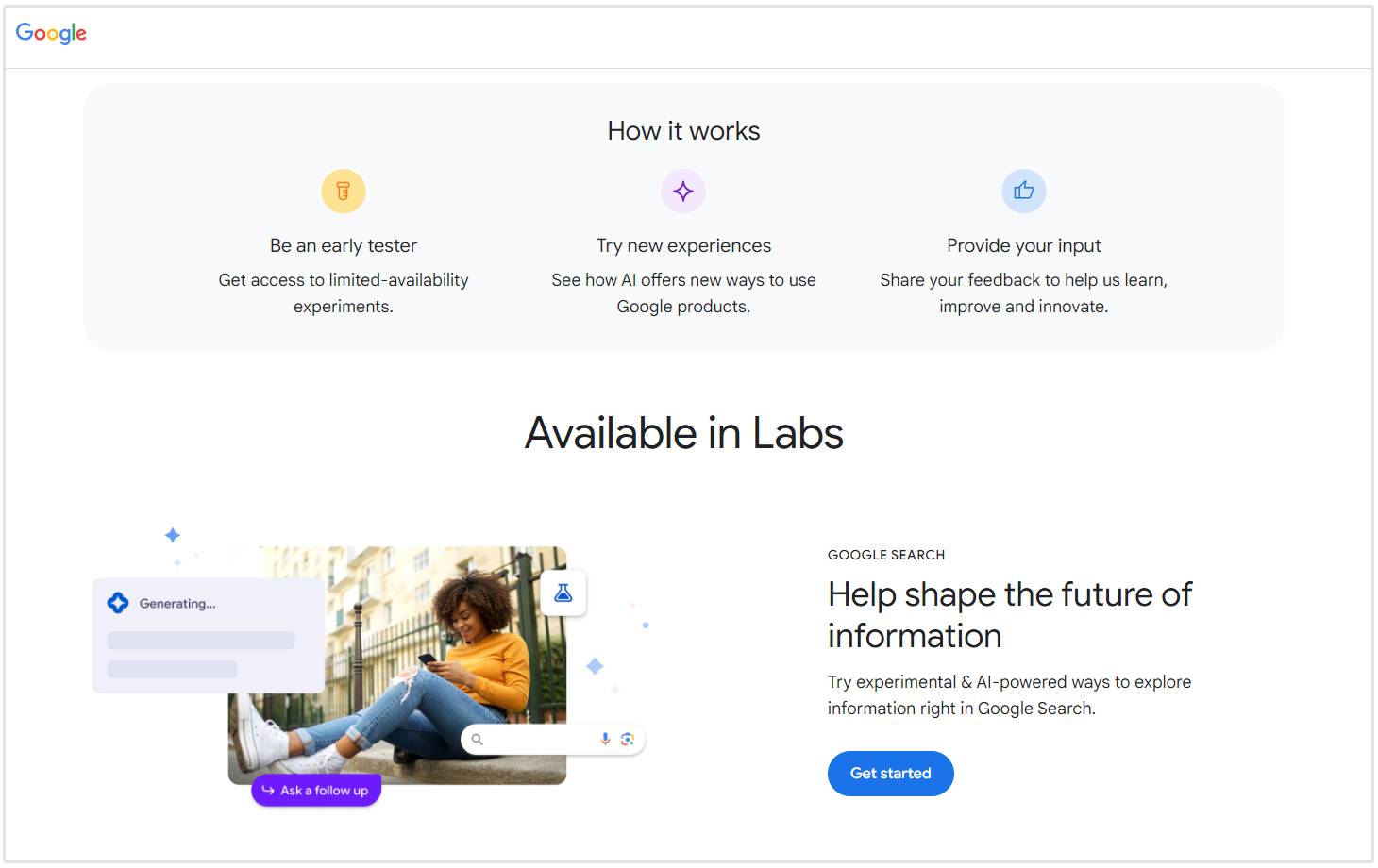
- Next, you’ll be asked to turn on SGE by switching the purple tab to the “on” option.
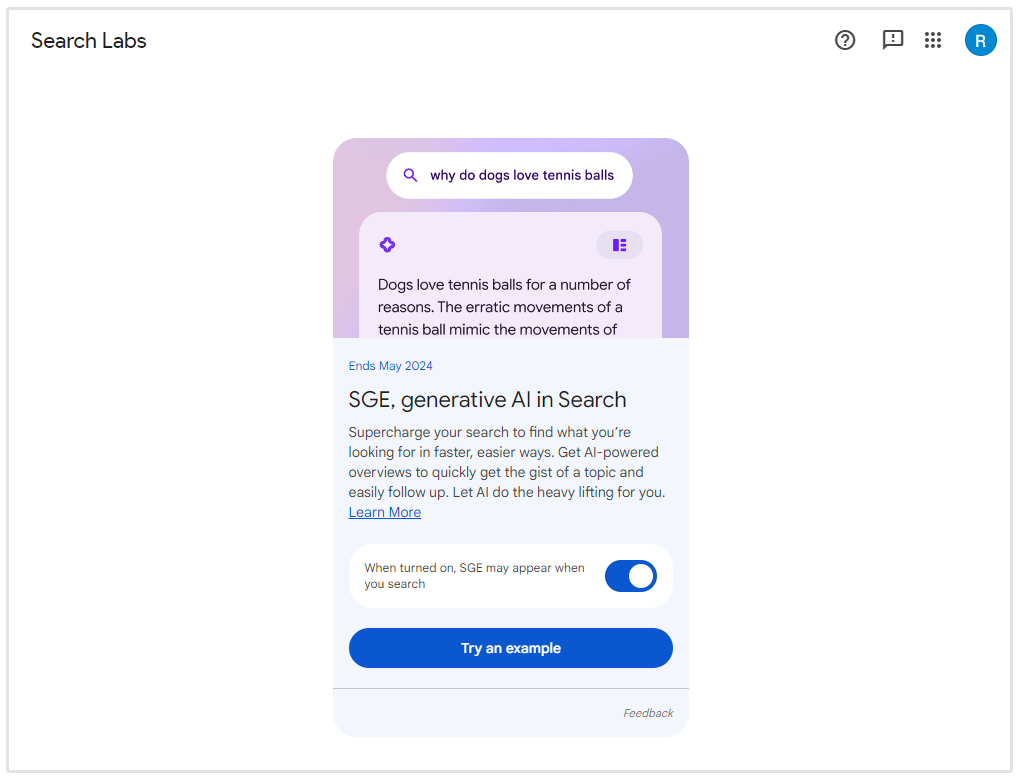
- You can click on “Try an example” or just go to google.com to try out the new SGE.
You’ll see the lab icon in the top right corner which indicates that the SGE feature is turned on.

Conclusion
There’s no doubt that AI will disrupt SEO going forward. However, instead of thinking about this in a negative way, you should arm yourself with the necessary skills and information to take advantage of this new technology.
If you fail to adapt your SEO strategies and tactics, then you might get left behind in this new era of Google’s Search Generative Experience.



















